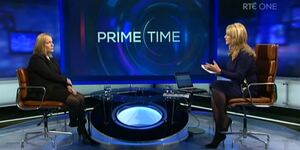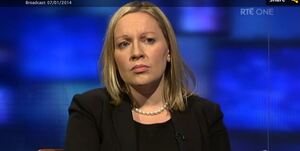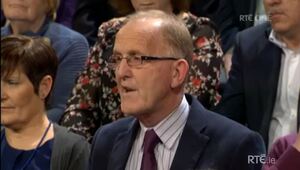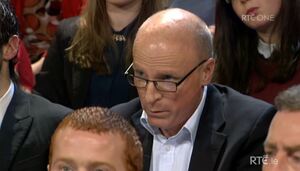Lucinda Creighton joined Claire Byrne on RTÉ’s Prime Time on Tuesday night ahead of the Reform Alliance’s conference in the RDS on Saturday, January 25.
And took some views from the audience….
Claire Byrne: “Lucinda, what is [The Reform Alliance]?”
Lucinda Creighton: “It’s…It’s a vehicle and a way for us, I suppose, to work together in the Dáil and Seanad to put forward ideas, where we have agreements and common position, we obviously don’t have that on everything. We meet once or twice a week. We go through the Seanad and Dáil agenda and we co-ordinate, we co-table motions, or amendments to legislation, things like that.”
Byrne: “Why do you need to call that something other than Fine Gael when, when…”
Creighton: “Because we’re in Fine Gael.”
Byrne: “But you’re members of the Fine Gael party?”
Creighton: “Some of us, Claire. Not all.”
Byrne: “But you made that very clear today. Why can’t you do that within the Fine Gael party as such?”
Creighton: “Well because, it’s been made clear to us we’re not wanted in the Fine Gael party.”
Byrne: “So why are you still in the Fine Gael party?”
Creighton: “Well, for me, I suppose I’ve been a member of Fine Gael since I was 18 years old, so there’s a certain attachment, needless to say I’ve worked very hard, both as a grassroots supporter, as a canvasser behind the scenes and, in more recent times, as a public representative. So it’s difficult, it’s not an ideal situation, I suppose from that nostalgic point of view, but I’ve a job to do, I’m an elected TD and I want to find ways to highlight issues that matter to Irish people.”
Byrne: “Do you reckon though that Fine Gael will kick you out now, for doing this, for setting up this conference, for registering with the Standards In Public Office organisation? Because if you start funding for the Reform Alliance, you could be taking fundraising away from Fine Gael?”
Creighton: “Well, there are a few questions in that. I mean, firstly, I think it would be bizarre if any political party didn’t welcome political debate. I mean I’ve hosted meetings in my constituency on every topic under the sun, from health to education to political reform in the past.”
Byrne: “That’s different though to taking their money, when it comes to fundraising?”
Creighton: “Well, hang on a second, the only people that are taking money at the moment in my name and in the name of my colleagues is actually the Fine Gael party.”
Bryne: “Yeah, but you’ve registered with the Reform Alliance, which allows you then to raise funds..”
Creighton: “Yeah, but it’s an important point cause a lot of people aren’t aware of the fact that, every year, the Fine Gael party receives, is now in receipt of about €300,000 in the name of TDs who have hand, act or part in the workings of the Fine Gael parliamentary party. And it is an important point because I think it should be given back to the Exchequer.”
Byrne: “You’re going to be raising funds now for the Reform Alliance. Fine Gael are also trying to raise funds all the time, everybody knows that, that’s what political parties do, so there is a very obvious conflict there.”
Creighton: “I don’t think there’s any conflict. I’m an elected member of the Oireachtas, my colleagues are also elected members of the Oireachtas, we have political engagement that we want to carry out. We want to organise events, we want to have meetings, we want to engage with the public and, you know, let’s remember what this is about. It’s not about political parties, it’s not about Fine Gael, Fianna Fáil, or anybody else. Politics is supposed to be about serving people. And, we have a situation where, in a recent referendum, 60% of the Irish voting public didn’t show up to vote. In the last general election, approximately 40% of people didn’t show up to vote. So we have a problem in terms of actually interesting, getting people interested and connected with politics. Political parties are often to be seen as very exclusive, to be a closed shop and the activities of political parties are often seen as something that does not appeal to and is not welcoming of the public, the actual people that are affected by political decisions. And what we’re trying to do, is give those people a chance to actually feed into the political system and that’s what we’re doing, by organising our meeting.”
Byrne: “Perhaps, dipping your toe in the water, to see what level of interest there is in another political party, is that a part of it as well?”
Creighton: “Well, no it’s not. I mean I don’t know what the future holds and I think there’s lots of speculation about the potential and possibilities of new political parties in the future. But that’s not the purpose of holding these meetings. We set off all along…”
Byrne: “But you wouldn’t rule it out either, just to be clear. You’re not going to say tonight the Reform Alliance will never become a political party.”
Creighton: “Well, I mean, if you had asked me a year ago, would I have been excluded from the Fine Gael parliamentary party for voting for something, according to what we said we would do, before the last election, I would have said no. So I’ve learned that, you know, there are no certainties in politics but…”
Byrne: “The Independent TD Finian McGrath issued a statement today, warning people about the Reform Alliance, saying look ‘this is just a bunch of disillusioned Fine Gaelers who, you know, share the Fine Gael philosophy around economics but not on social policy’. Is that a fair assessment, do you think?”
Creighton: “I, I mean, I think it’s clear that our political background we’ve come from, the Fine Gael party, I don’t think that there’s any crime in that. I don’t know, well I’ve some idea of what Finian’s own political background is. I think it’s bizarre that any democrat in this State, particularly one who holds public office would warn about a movement, to try and engage people in political discourse and to ensure that we actually do politics better. So I don’t know what Finian is fearful of, I don’t know what my other colleagues in the Oireachtas are fearful of. I think we should all embrace greater engagement and greater discussion of politics. We desperately need political reform. I know you’re about to have a discussion [later in the programme] about the future and the post-bail out period. You know it’s a very, I think it’s a very interesting discussion to have because Ireland has changed, people’s incomes have dropped dramatically. A lot of people have lost their jobs. A lot of people have been forced to emigrate as we know. Yet politics in this country hasn’t changed at all. We haven’t reformed the political system. That’s something that my party committed to do before the last election, it hasn’t done in Government and it’s one thing that I’m personally very disappointed about.”
Byrne: “OK.”
Creighton: “And it’s something I was disappointed about as a minister, and I’m still disappointed as somebody who’s now outside of the parliamentary party.”
Byrne: “OK. Let’s see what our audience thinks, Walter Lacey (above), Walter you’re very welcome. You are an Independent councillor now in Carlow. But you were there at the very start of the PD movement. Does this remind you of the start of the Progressive Democrats, what you’re hearing here tonight?”
Walter Lacey: “It does to a certain degree but, back in 1985, there seemed to be a huge appetite, at the time, for a new political movement. And a lot of work had been done in the background, as Lucinda and the members appear to be doing. At that time people, like myself, literally came in off the street in Carlow to the Wright Hotel, at the time, to a public meeting which was crammed out the door and there was a huge appetite and many of us joined the party at the time.”
Byrne: “And is the appetite here now, do you think?”
Lacey: “I think it is, I think it’s slightly different in that it’s probably more planned, more thought-out and maybe taking it a little bit longer and I can understand the reasoning behind it. But there’s some confusion then. Some of the messages coming are that maybe it’s a new party. Other members of the seven, the group of seven, are sort of sending out the message that that’s not necessarily the position. But I certainly think it’s time for a new political movement and I think the time is now. It needs to be principled and I think there’s none more principled than the lady sitting opposite you there, to begin such a movement.”
Byrne: “Ok, well I want to come to somebody else who has an opinion about the people who are behind this. Jack Leahy (above) Jack, you’re very welcome. Is Lucinda the right person to lead this movement, do you think?”
Jack Leahy:“I just think it’s interesting that the movement seems to have very obviously arisen from opposition to what was a 21-year-old judgement by the Supreme Court. So I just wonder how the group justifies any association with the term ‘reform’ given that the reform that was introduced, that they obviously oppose is something that was welcomed by most people in the country.”
Byrne: “So conservatives leading the reform agenda is not for you, you’re saying?”
Leahy: “Yeah.”
Byrne: “Linda, do you want to respond to that?”
Creighton: “That’s fine, I mean, I think that’s the beauty of democracy, not everybody has to agree, clearly. I’m not going to rehash the whole debate that we had last June and July, other than to simply say that, for me, it’s about standing by what, you know, commitments that you make and promises that you make in political life. And my party made a commitment, my party leader made a commitment and I made a commitment and it wasn’t honoured. And, you know, there’s a small group of us who chose to act according to the promises that we made before the last election. Whether you agree with them or not is, is, you know, it’s a matter for each individual.”
Byrne: “All right. I want to another voice on this from the audience. Now Fergal McCarthy and Fergal, you’re a former Labour party member, is that right?”
Fergal McCarthy: “That’s correct.”
Byrne: “Do you welcome the Reform Alliance?”
McCarthy: “I’ll just got back to what Linda said there, or Lucinda said a while back. She said interest was low, quite rightly, and that the 60% no-show in the last, one of the recent elections. And I think it’s down to the fact that people have become politically agnostic. I looked it up today before I came in and you could be described as a registered voter, myself; politically informed, I’d like to think so; but you basically become indifferent to the popular political parties because, I believe, and I don’t see the Reform Alliance as being any different. I believe that the political parties are so ideologically similar now, so mired in their own bureaucracies that they’ve lost their, they’ve outlived their usefulness.”
Byrne: “So, has Lucinda said anything tonight that’s convinced you that this will be any different.”
McCarthy: “No, nothing whatsoever.”
Byrne: “This is a problem, isn’t it Lucinda. That people will see that you left on principle, you left Fine Gael on principle. Or you were asked to leave because of a point of principle. So, if that abortion legislation moment hadn’t have happened, you’d still be a junior minister. So you’re not leading this from an ideological place.”
Creighton: “Quite possibly but I’m not sure, I’m not convinced that a huge, ideological chasm is what we need in this country necessarily. I think what we need is integrity in public life. I think we need honesty. I think we need people who go before the electorate and say they will do certain things and actually get into Government and do them and are held to account. And that’s the kind of politics I’m interested in. I’m not interested in cronyism, I would like to see a lot more transparency in terms of how we actually run the country, how we run the State, how we appoint people to boards, all of the commitments that were made around quangos and so on. And they are things that unfortunately haven’t happened.”
Watch in full here







